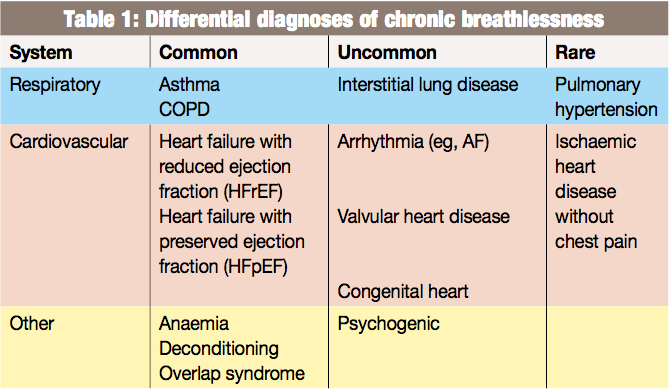Shortness of breath
Causes of shortness of breath
Investigations for shortness of breath
Physiotherapy strategies for shortness of breath
Why am I always breathless?
We have all felt puffed running to the bus or during strenuous exercise, but shortness of breath whilst doing every day activities may not be normal. Breathlessness, sometimes called dyspnea, is an uncomfortable sensation whilst breathing. It can occur acutely or chronically.
Breathlessness may be caused by problems with the lungs, heart, blood, muscles or ones levels of fitness. Sudden onset shortness of breath may be a medical emergency and require ambulance/ hospital admission to investigate for causes including pneumonia, collapsed lung (pneumothorax), asthma attack, fluid in the lungs (pulmonary edema) and heart attack (myocardial infarction).
If you have shortness of breath which develops and remains over weeks to months you should book in to see your GP to further investigate this. Common lung causes include asthma and emphysema which are both conditions characterized by inability of the lungs to adequately empty air, sputum production and wheeze. The most common heart problem causing chronic shortness of breath is heart failure, a condition where damage to the heart causes inability to pump adequate blood around the body to meet demands. Other common causes that need investigating and ruling out are anemia and deconditioning.
If you have ongoing shortness of breath and are concerned, you should book in to see you GP and have tests to exclude the following conditions:
What tests should I have done to investigate shortness of breath?
If you have been short of breath for weeks to months, the most important first step is to book in to see your GP. The information that can be obtained by talking through symptoms gives important clues to the potential cause of breathlessness in many situations.
Depending on your past medical history and other symptoms your doctor might request the following
- blood tests looking for anaemia
- chest x-ray
- heart tracing (ECG)
- breathing tests to see how yourlungs are working (the tests are known as spirometry and diffusion capacity) carbon monoxide)
If your doctor doesn’t have the answer from the above investigations or is concerned about your heart as a potential cause of breathlessness, then they may recommend you have an ultrasound of the heart (echocardiogram aka an “echo”). Your GP may also suggest a special blood test called a BNP which is a hormone secreted by the heart in heart failure.
Similarly if your doctor is more concerned about the lung you may be recommended to have a CAT scan of the lungs (CT chest). Alternatively a V/Q scan (ventilation / perfusion) may be suggested; this is a special scan comparing the ability of the lungs to move in/out air relative to blood flow. Other tests may look at how your hearth or lungs are functioning when you exert yourself eg when riding a bike. This test is called a cardiopulmonary exercise test and may help the doctor to differentiate between a cardiac or lung problem.
It may feel like you have spent your whole week getting blood tests, poked and prodded after all these tests. Putting together these vital tests results together your GP should be able to answer where the problem is and recommend either a treatment strategy or refer you to a lung specialist.
Finding a cause is important
By working through the history, clinical examination and reviewing relevant investigations a cause for shortness of breath is usually possible. A trial of treatment may be indicated, and a review to see if symptoms are improving is important. The exact treatment will depend on the provisional diagnosis or cause suspected by your doctor.




